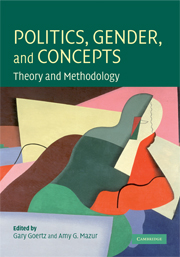Book contents
- Frontmatter
- Contents
- List of figures
- List of tables
- Notes on contributors
- Acknowledgments
- 1 Introduction
- 2 Mapping gender and politics concepts: ten guidelines
- Part I Gendering Concepts
- 3 Gendering democracy
- 4 Gendering representation
- 5 Gendering the welfare state
- 6 Gendering governance
- 7 Gendering development
- Part II Gender-Specific Concepts
- Appendix: A website for additional gender and politics concepts
- References
- Index
3 - Gendering democracy
Published online by Cambridge University Press: 06 July 2010
- Frontmatter
- Contents
- List of figures
- List of tables
- Notes on contributors
- Acknowledgments
- 1 Introduction
- 2 Mapping gender and politics concepts: ten guidelines
- Part I Gendering Concepts
- 3 Gendering democracy
- 4 Gendering representation
- 5 Gendering the welfare state
- 6 Gendering governance
- 7 Gendering development
- Part II Gender-Specific Concepts
- Appendix: A website for additional gender and politics concepts
- References
- Index
Summary
The concept of democracy has a long history of attention to definition and measurement. Numerous definitions have been proposed and refined (e.g. Schumpeter 1942, Sartori 1987, Dahl 1971, Schmitter and Karl 1991, Bollen 1990, Przeworski, Alvarez, Zhebub, and Limongi 2000). And many measures of democracy have been created for use in empirical research (e.g. Gastil 1978, Bollen 1998, Jaggers and Gurr 1995, Alvarez, Cheibub, Limongi, and Przeworski 1996, Vanhanen 2000). Attention to definition and measurement is critical as social scientists seek to understand the determinants and consequences of liberal democracy (e.g. Burkhart and Lewis-Beck 1994) and practitioners attempt to spread democracy around the world (USAID 1997, Finkel, Perez, Linan, and Seligson 2007). Both this policy and academic work presupposes the accuracy of measures of democracy. Despite the amount of ink spilled on definitions of democracy, little attention is generally paid to gender in discussions of the concept (Waylen 1994, Pateman 1989). And although measures of democracy are frequently critiqued (e.g. Bollen and Paxton 2000, Mainwaring et al. 2001, Munck and Verkuilen 2002, Bowman, Lehoucq, and Mahoney 2005), gender is rarely explicitly considered in measurement (Paxton 2000).
In this chapter, I demonstrate that although one could argue that the concept of democracy is gendered in principle, women are not actually included in practice. That is, although definitions are generally inclusive, requiring all adults of a certain geographic area to have certain political privileges, measures of democracy often fail to include women as political participants.
- Type
- Chapter
- Information
- Politics, Gender, and ConceptsTheory and Methodology, pp. 47 - 70Publisher: Cambridge University PressPrint publication year: 2008
- 10
- Cited by



